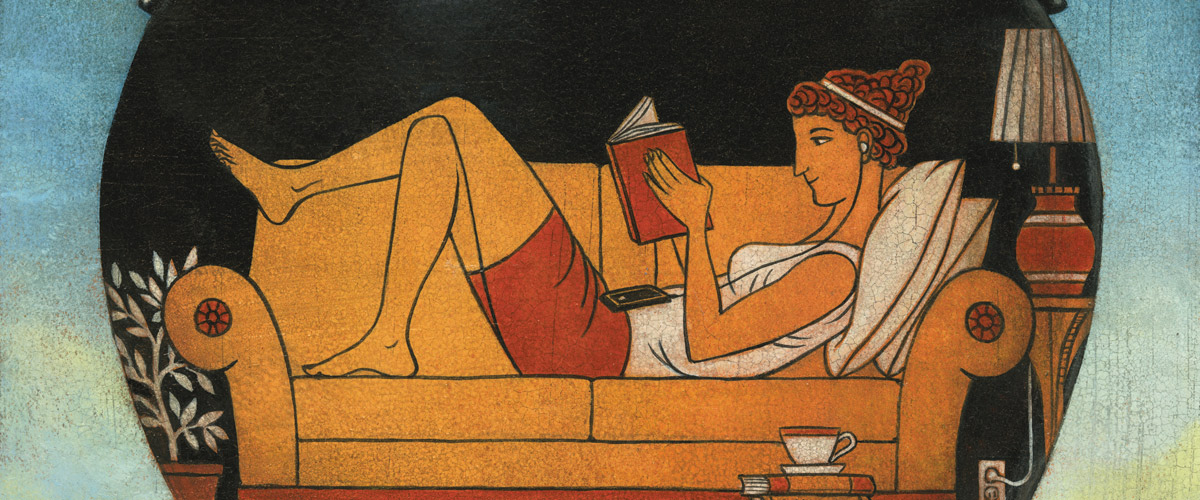AUTUMN STILES ’14, AARON BENNETT ’13, AND Dillon Wilson ’13 launched a new literary magazine, The New Old Stock, last year. The idea was to publish new works, but also to show the timelessness of the classics and their commentary on the modern world. “Call us old-fashioned,” they write on their website, “but there’s something eternal about Kerouac’s spontaneous prose and the bravado of Whitman. For us, the practical advice of the Roman Stoics is just as relevant to a modern audience as it was to an ancient one.”
We asked Stiles and Bennett to offer up a few suggestions for literature and poetry we may have missed the first time around—and to show us why each work still matters.
Nightwood. What does the name suggest? Darkness, yes. And richness, too. Secrecy, intrigue, things that go bump in the night. All of these connotations are, of course, valid, and they are the very connotations that set the stage for Djuna Barnes’ narcotic and sensual magnum opus.
Published in 1936 and considered by many to be a modernist masterpiece, Nightwood is an unflinching meditation on the ambiguous virtues and depraved splendor of humanity. There is no cessation of wonder to be found within its pages; it extols emotion and finds sacred in the profane. It is fiercely written, with prose that is alive, romping on the page, only to recline, sinuous and catlike, before cracking back, sparkling and tense.
It is an account of 1920s and 1930s Paris, and the people who live there: Robin Vote, her cuckold of a husband, and her two lovers, Nora and Jenny. But Nightwood is no more just a narrative than “The Wasteland” is just a poem. And yet, unlike the latter, Nightwood seems wholly unappreciated. Despite the brilliant accolades from Thomas, Burroughs, and Joyce (among others), it has led a markedly quiet existence over the years. Ironically, Nightwood is perhaps more relevant now than ever. Not only does it grapple with all manner of identity—ethnicity, eccentricity, lineage, gender, and sexuality—but its characters are devastatingly human. There is a comfort in that—in reading human anguishes and ecstasies that play out with such candor, while avoiding entirely any melodrama or farce.
So why have so few people read what William S. Burroughs called “one of the great books of the 20th century”? The argument could be made that it is difficult, but so too is Ulysses or The Sound and the Fury. And though Eliot, in his preface, called the novel one that “only sensibilities trained in poetry can wholly appreciate,” I disagree (yes, one is allowed to disagree with T.S. Eliot). Nightwood is hard, but it is by no means inaccessible. In fact, its handling of its themes and its cinematic quality make it, in my opinion, incredibly manageable. And given the current sociopolitical climate and the advent of increased LGBTQ visibility in popular media (Orange is the New Black, Brokeback Mountain, Brooklyn Nine-Nine, and Carol, to name a few) Nightwood—as a novel that is openly and unapologetically “gay fiction”—is essential.
Nightwood is a tough read, but what good literature comes easy? Reading it is like “drinking wine with a pearl dissolving in the glass,” wrote Jeanette Winterson in the preface to the novel. “You have taken in more than you know…. from now on, a part of you is pearl lined.” Nightwood’s characters live in the margins, but Nightwood shouldn’t have to, for though its world may seem liminal, the truths displayed therein are boundless.
—Autumn Stiles
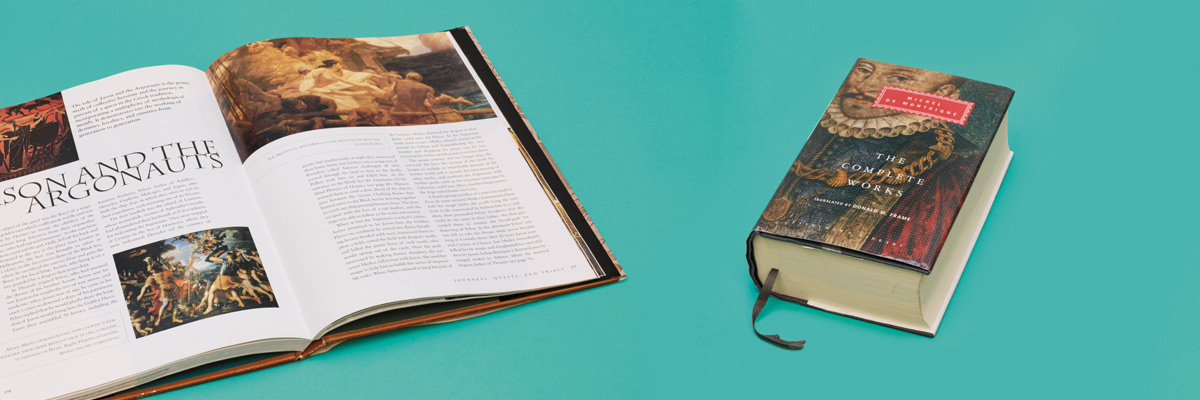
The 16th-century philosopher and writer Michel de Montaigne is often considered the father of the modern essay. Now before you go blaming him for that 10-page paper you’ve put off for as long as possible or the report that’s due to the boss on Monday, know that Montaigne’s essais are not what you think. During his lifetime, he produced a total of 107 chapters with themes ranging from profound (“On Solitude”) to strange (“Cannibals”), to curiously specific (“Not to Counterfeit Being Sick”). In these writings Montaigne allows his mind to wander gracefully, and he dutifully records the thoughts of an uncensored brain. What results is a voice that’s as profound as it is colloquial. “On Solitude” implores the reader to find satisfaction internally due to the ephemeral nature of outside pleasures. And he’s right—all good things end: the 1995 Cleveland Indians, that steak I ate last week, Zeppelins, Hey Arnold!, mid-2000s Kanye West. That’s why it’s hard to argue with Montaigne when he says things like:
“… let us make our happiness depend on ourselves; let us loose ourselves from the bonds which tie us to others; let us gain power over ourselves to live really and truly alone—and of doing so in contentment.”
—Aaron Bennett
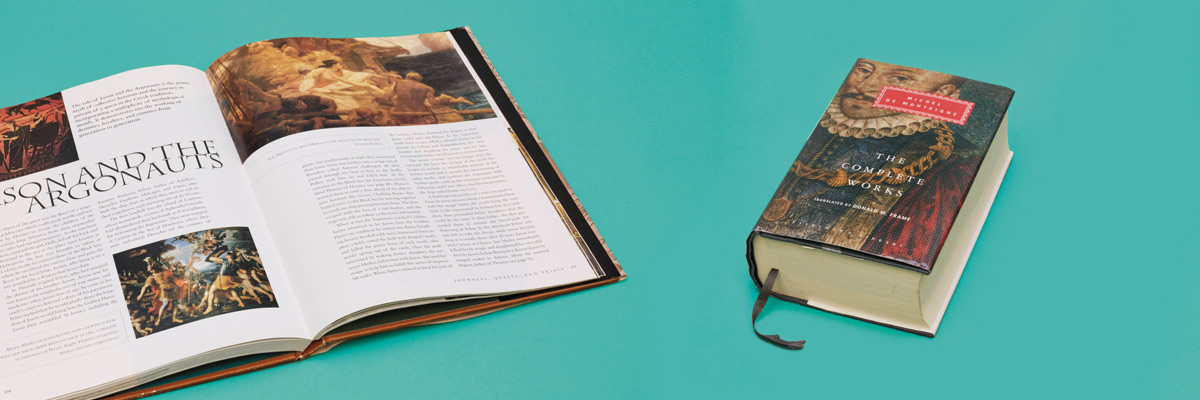
On Letting Go
The 16th-century philosopher and writer Michel de Montaigne is often considered the father of the modern essay. Now before you go blaming him for that 10-page paper you’ve put off for as long as possible or the report that’s due to the boss on Monday, know that Montaigne’s essais are not what you think. During his lifetime, he produced a total of 107 chapters with themes ranging from profound (“On Solitude”) to strange (“Cannibals”), to curiously specific (“Not to Counterfeit Being Sick”). In these writings Montaigne allows his mind to wander gracefully, and he dutifully records the thoughts of an uncensored brain. What results is a voice that’s as profound as it is colloquial. “On Solitude” implores the reader to find satisfaction internally due to the ephemeral nature of outside pleasures. And he’s right—all good things end: the 1995 Cleveland Indians, that steak I ate last week, Zeppelins, Hey Arnold!, mid-2000s Kanye West. That’s why it’s hard to argue with Montaigne when he says things like:
“… let us make our happiness depend on ourselves; let us loose ourselves from the bonds which tie us to others; let us gain power over ourselves to live really and truly alone—and of doing so in contentment.”
—Aaron Bennett
The Other Greek Epic
Pretend for a moment that you’ve been sent on “a cruel voyage” by an illegitimate king who not only wants you to fail, but also hopes you die in the process. The mission instructs you to procure a Golden Fleece guarded by a dragon and in the possession of a tyrant. Before accomplishing this feat, however, you will confront razor-clawed harpies, death-crunching cliffs, fire-breathing bulls, and humanoid seed soldiers. It would take many miracles to survive such an undertaking, but luckily for you, the gods are on your side—or most of them, anyway.
Such are the difficulties faced by Jason, the hero in the only surviving work of Apollonius of Rhodes: Jason and the Argonauts (known formally as the Argonautica). Though often overshadowed by the Iliad and Odyssey, this epic poem relates to a contemporary audience. Compared to the demigod Achilles and master strategist Odysseus who star in the Homeric epics, Apollonius’ Jason is a common man. It becomes apparent that our hero, frequently described as “resourceless,” and “at a loss,” will need all the help he can get in order to succeed.
The one thing Jason is good at, however, is recruiting talent. Much like the stacked 1992 U.S. men’s Olympic basketball “Dream Team” that had the likes of Michael Jordan, Larry Bird, and Magic Johnson on its roster, Jason’s 51 Argonauts are described as “the finest heroes to ever have sailed.” This description is well deserved—about a fourth of the crew are demigods and the rest are the best fighters and sailors from their respective towns.
The more we realize how normal Jason is compared to his crew, the more he becomes one of us. In this way, we too are heroes, and with a little courage and perseverance, we can overcome the most difficult of challenges. It’s the perfect adventure story for those who think Homer has hogged the spotlight for far too long.
—Aaron Bennett
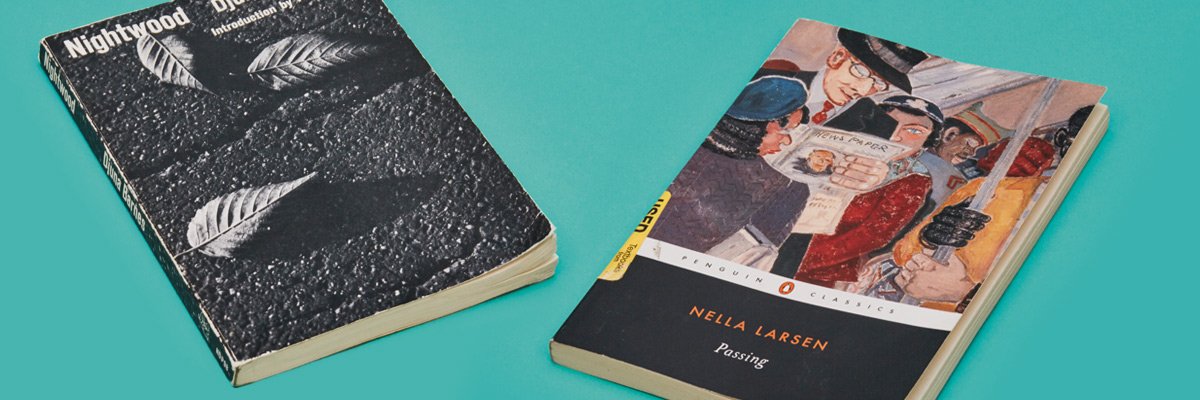
Questions of Race
From excoriating culturally appropriated Halloween costumes, to backlash at the media’s condemnation of Zendaya’s hair, to the praise of Miley Cyrus, pop culture has reached peak awareness. As a result, the phrase “postracial society” has been volleyed back and forth across forums and news sites, making plain that discussions about race are as relevant as ever, and that negating its existence as inconsequential is simply impossible. But while pop culture is just now starting to deal in identity politics, the arts (and here, literature) have always been concerned with them and their effect on daily life. Questions of being, questions of self—these are questions essential to the novel Passing by Nella Larsen.
These questions are even more relevant during major shifts of societal change. When there is war or political upheaval, or when pre-existing dogma is challenged in any way, the literature (and the culture) reflect that. Passing is such a piece of literature. Set in 1920s Harlem, it is a tale of two women, and yet it is also a work about the fluidity of self and about society’s judgment.
A Shakespearean prologue of Passing would read something like: “Two women, alike in ethnicity, in roaring Harlem where we lay our scene, from ancient blood break to new identity, where black blood makes one’s hands unclean.” Irene and Clare, our protagonists, are “mulatto” women who grow up together. Following the death of her parents, Clare is sent to live with her white aunts. These newfound living circumstances, coupled with her fair complexion, allow her to ultimately “pass” for white. Irene, the darker of the two, is assumed Spanish or Italian, but she too enjoys the privileges of racial ambiguity.
As an adult, Clare is wed to a racist white man keen on racial purity. Fast forward through secrecy and infidelity (is Irene’s husband in love with Clare? Is Irene in love with Clare?), and the novel culminates in Clare’s death: her husband storms into her party and “outs” her as black; shocked, she falls to her death from an open window (it is unclear whether she is pushed by Irene or by her husband, or whether she jumps to her own demise). Typically this plotline is chalked up to the “tragic mulatto” trope. But I believe Passing is not just a racial novel; rather, race is a catalyst and context against which very real, very human dramas play out. The emotions are there, and race exacerbates them, pushing them to a more grotesque and dangerous nadir.
Unfortunately, the fascination and “microaggressions” associated with mixed-race identities found within Larsen’s novel have persisted past the ’20s (see Chris Rock’s film Good Hair, Kylie Jenner, and Rachel Dolezal, who oddly enough “passed” the other way). As such, Passing has never been more relevant, and ironically, perhaps never more overlooked. The first time I read it myself was in a Denison classroom, and I was shocked that as a biracial woman I had never known this novel—not to mention, Larsen lived for a time in my hometown (Jersey City, N.J.). Mind blown. Ultimately, Passing is harrowing, engaging, thoughtful. It is a slim novel, entertaining as any, and yet it speaks to lived truths; to people’s existence, their identity, and the denial and suppression of it.
—Autumn Stiles
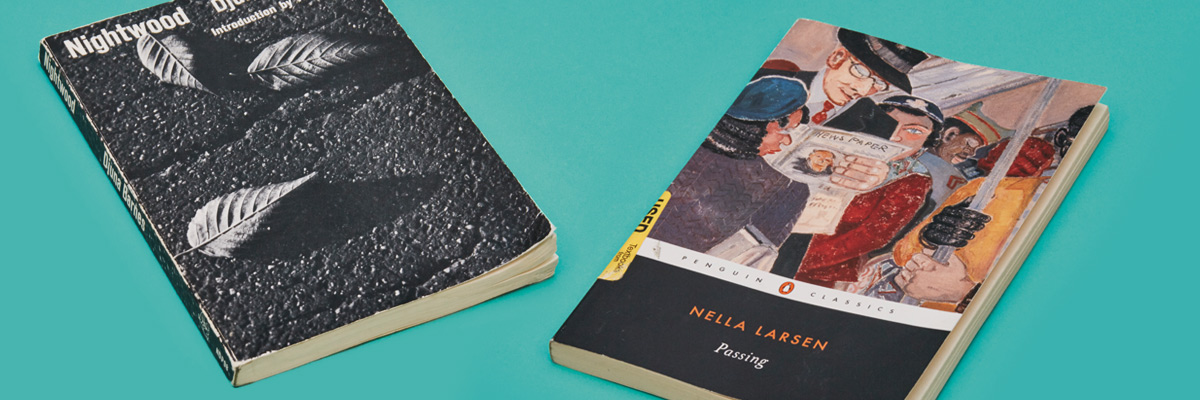
Questions of Race
From excoriating culturally appropriated Halloween costumes, to backlash at the media’s condemnation of Zendaya’s hair, to the praise of Miley Cyrus, pop culture has reached peak awareness. As a result, the phrase “postracial society” has been volleyed back and forth across forums and news sites, making plain that discussions about race are as relevant as ever, and that negating its existence as inconsequential is simply impossible. But while pop culture is just now starting to deal in identity politics, the arts (and here, literature) have always been concerned with them and their effect on daily life. Questions of being, questions of self—these are questions essential to the novel Passing by Nella Larsen.
These questions are even more relevant during major shifts of societal change. When there is war or political upheaval, or when pre-existing dogma is challenged in any way, the literature (and the culture) reflect that. Passing is such a piece of literature. Set in 1920s Harlem, it is a tale of two women, and yet it is also a work about the fluidity of self and about society’s judgment.
A Shakespearean prologue of Passing would read something like: “Two women, alike in ethnicity, in roaring Harlem where we lay our scene, from ancient blood break to new identity, where black blood makes one’s hands unclean.” Irene and Clare, our protagonists, are “mulatto” women who grow up together. Following the death of her parents, Clare is sent to live with her white aunts. These newfound living circumstances, coupled with her fair complexion, allow her to ultimately “pass” for white. Irene, the darker of the two, is assumed Spanish or Italian, but she too enjoys the privileges of racial ambiguity.
As an adult, Clare is wed to a racist white man keen on racial purity. Fast forward through secrecy and infidelity (is Irene’s husband in love with Clare? Is Irene in love with Clare?), and the novel culminates in Clare’s death: her husband storms into her party and “outs” her as black; shocked, she falls to her death from an open window (it is unclear whether she is pushed by Irene or by her husband, or whether she jumps to her own demise). Typically this plotline is chalked up to the “tragic mulatto” trope. But I believe Passing is not just a racial novel; rather, race is a catalyst and context against which very real, very human dramas play out. The emotions are there, and race exacerbates them, pushing them to a more grotesque and dangerous nadir.
Unfortunately, the fascination and “microaggressions” associated with mixed-race identities found within Larsen’s novel have persisted past the ’20s (see Chris Rock’s film Good Hair, Kylie Jenner, and Rachel Dolezal, who oddly enough “passed” the other way). As such, Passing has never been more relevant, and ironically, perhaps never more overlooked. The first time I read it myself was in a Denison classroom, and I was shocked that as a biracial woman I had never known this novel—not to mention, Larsen lived for a time in my hometown (Jersey City, N.J.). Mind blown. Ultimately, Passing is harrowing, engaging, thoughtful. It is a slim novel, entertaining as any, and yet it speaks to lived truths; to people’s existence, their identity, and the denial and suppression of it.
—Autumn Stiles
This Should Make You Feel Better
Reading Voltaire’s Candide does for bad days what a pint of ice cream does for a broken heart.
It’s unlikely that any of us will endure the suffering that the characters of this book go through. While Voltaire is certainly known for his biting wit and satire, this book’s attack on the idea that ours is the best of all possible worlds comes from a serious place. In 1755, after witnessing the infamous Lisbon earthquake that killed approximately 30,000 people, Voltaire was moved to write a story attacking the notion that catastrophic tragedies like this are truly “for the best.”
Our main character, Candide, is tutored by Pangloss (a caricature of the philosopher Leibniz), who instills in him the belief that all things are for the best because we live in the best of all possible worlds. Candide’s belief in this idea is tested throughout the book: Both he and his friends are tortured and left for dead, sold into slavery, and robbed of all worldly possessions. Every major female character is raped. Everyone suffers. These tragedies happen continuously throughout the story, leading our protagonist to cast serious doubt on the ideas of Optimism.
And yet despite experiencing multiple lifetimes’ worth of pain, the beauty of this story resides in Candide’s ability to remain comically hopeful in spite of the terrors surrounding him. Make no mistake, this book’s outlandish violence is funny in the same way Tom and Jerry cartoons are funny. We laugh because we know Tom is apparently indestructible and will always make a full recovery. Though Voltaire’s characters function similarly, it’s unclear whether Candide and his friends will ever completely recover from their predestined hardship. One thing they are left with, however, is hope. With that they have a shot—we all do.
—Aaron Bennett
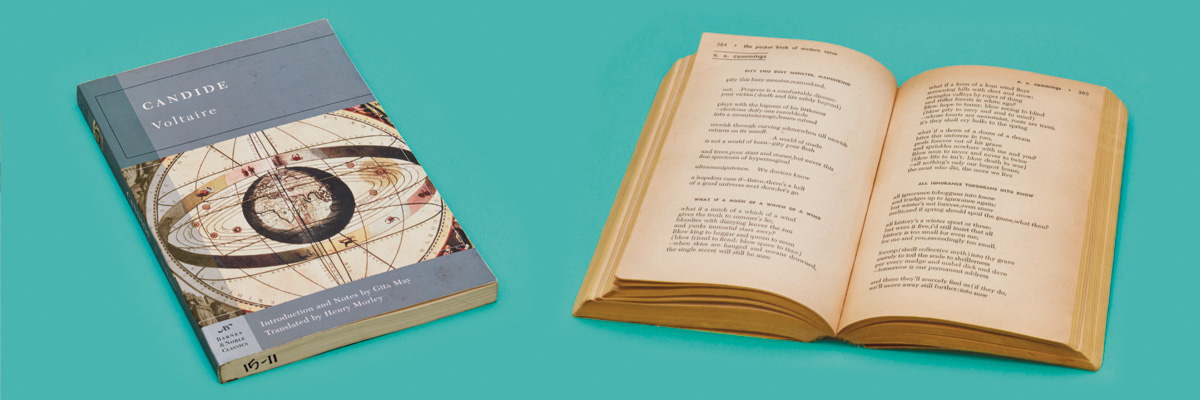
e.e. cummings. The name, adorably round in the lowercase, is today synonymous with the informal, self-deprecating “i” (a stylistic choice now slightly hackneyed—even I’ve riffed off his style; what undergrad poet has not?). Though likely familiar to readers through his erotic work (think “eyes big love-crumbs” and “under me you so quite new”), the scope of cummings’ verse is so much broader. This is not to say that his less sensual work is not appreciated by popular culture and the canon alike. (I would never suggest such a thing for fear of being smitten by the gods, or by one of my former poetry professors.) However, there seems to be a tendency to forget just how hard, how cutting, and how absolutely mocking much of his work is, and can be.
“Buffalo Bill’s defunct.” So begins one of my favorite cummings poems, and arguably one of his best. “[Buffalo Bill’s]” has the transitory quality and length of a tweet—but an aforementioned hardness and a sonic appeal that seduces, just like his erotic poems. The constant alliteration, the playful, sharp swings in tone and rhythm, the syntax—all of these elements make this tiny, compact poem vibrate with energy. And yet, it’s about death—the death of Buffalo Bill, aka William Cody. Cody was an all-American showman. A huntin’, shootin’, ridin’, bearded buccaneer who became the archetype of freedom, masculinity, and spirit—to which this poem is clearly a testament.
Like the man who wrote it, “[Buffalo Bill’s]” is defiant and dynamic. When you read it, you really can hear it, for despite the morbidness and subject, the language and tone are as fresh as ever. And of course, the poem poses the question, do celebrities or legends ever die? It may seem a trite question now, given the inundation of our everyday lives with the extravagance, squalor, fascination, and disillusionment of celebrity; however, that only makes it more relevant.
With this poem, I’m reminded of the recent deaths of David Bowie and Alan Rickman. Or the infamous deaths of Michael Jackson, Marilyn Monroe, Amy Winehouse, and Kurt Cobain. These people defined generations, created spaces, and altered history. So too did Buffalo Bill. And that sense of wonder, of the plain made mythic and the mythic made plain, slams into you immediately from this poem’s first line. cummings is adroit and exact with his language, and the result is a poem that explodes, that ricochets. Sardonic, adulatory, scintillating, angry. It is hard, clean, good writing, elevated not by its subject, but by its treatment of that subject. It is a fine tribute, and a finer poem.
—Autumn Stiles


